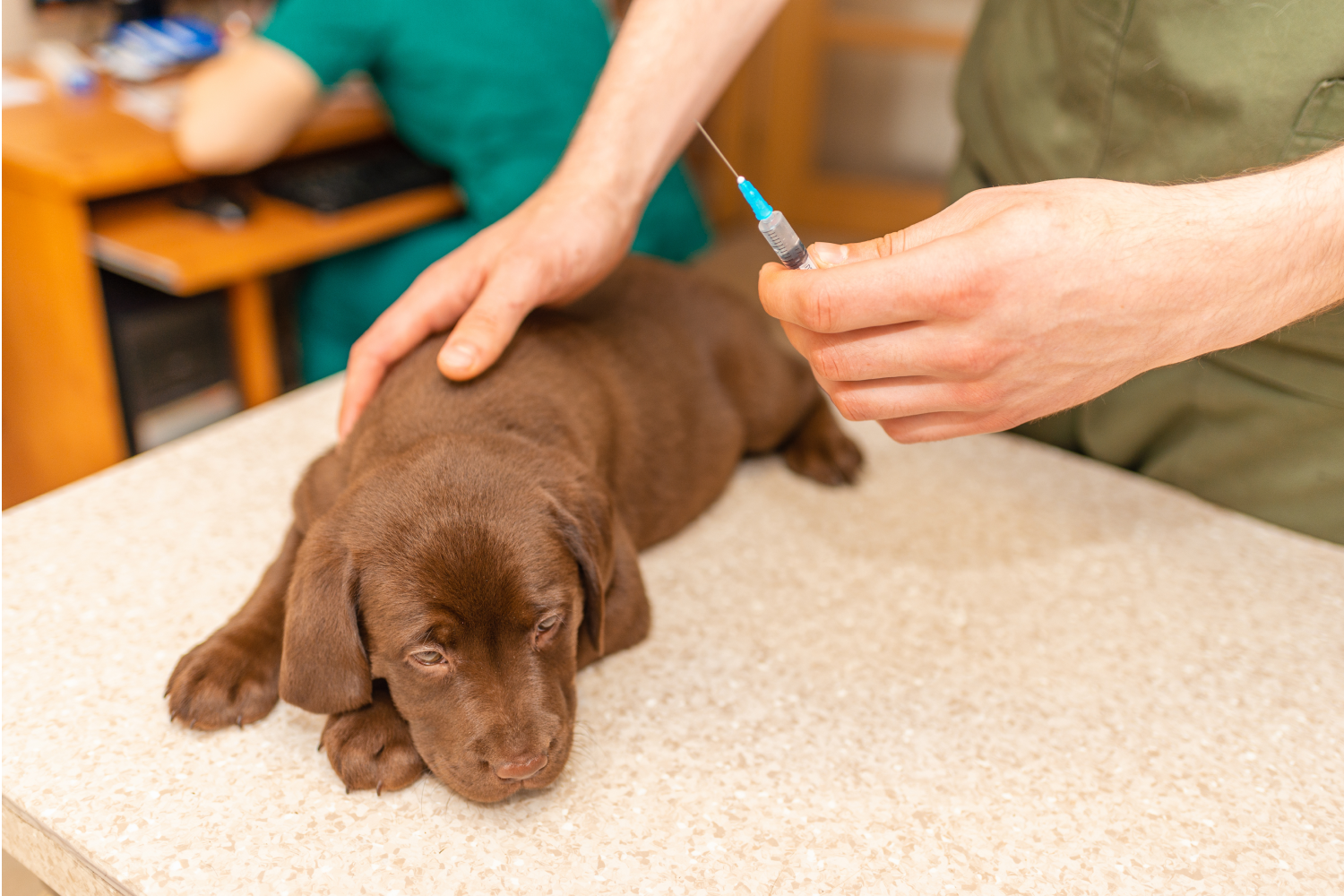
BOGO: buy a box of Longevity15 and get Yummy Combs free!
Shop now and get the BOGO deal today!
Joseph Roetheli, PhD

Highlights:
Vaccinations help protect your new puppy against illnesses that, in some cases, could become life-threatening.
Understanding how puppies react to certain vaccinations is important in making sure your puppy isn’t having an adverse reaction to their shots.
After a vaccination appointment, rewarding your puppy with a tasty, nutritious treat like Yummy Combs® can help comfort them.
Your new bundle of fur is a ball of energy and already delivering joy to your life with every little bark and belly rub. Taking care of your puppy is a top priority, and you understand that caring for them will involve vaccinations.
Vaccinations help prevent diseases that could be life-threatening to your puppy. Like most living creatures, puppies rarely enjoy trips to the veterinarian’s office or getting shots. You can help by providing calm support and knowing the signs to look for in case your puppy has an adverse reaction to a vaccination.
We’ll tell you everything you need to know about the vaccines your dog will receive and what to expect in the hours and days following a vaccination appointment.
The American Animal Hospital Association recommends two types of vaccinations: core and non-core.
Core vaccinations prevent diseases that can be fatal for puppies. They are usually given between six and eight weeks of age, with booster shots every four weeks. Some core vaccinations are given yearly.
Core vaccinations are an essential part of your dog’s care. Even if you do not own other dogs and do not plan to expose your dog to other animals, the risk of airborne illness and contact with other animals’ fecal matter makes these vaccinations necessary for your puppy.
Non-core vaccinations are available to help prevent the spread of illness in dogs that will be boarded or around other animals. If you plan to take your dog to a dog park, for instance, considering these vaccinations is a good idea.
If you are concerned about which non-core vaccinations to get your dog, consult their veterinarian.
Your puppy’s veterinarian will likely recommend vaccinations beginning at six to eight weeks of age. In some states, a puppy must be between eight and 10 weeks old before they can be adopted from a breeder or shelter. If this is the case, your puppy may have already had their first round of vaccinations.
Generally, a puppy will receive a distemper and parvovirus vaccination between six and eight weeks of age. They may also receive a Bordetella shot during the same visit.
The next round of vaccinations will take place between weeks 10 and 12. The core vaccination known as DHPP (distemper, hepatitis, parainfluenza, and parvovirus) is given to dogs this age, along with a booster Bordetella shot if your dog gets the Bordetella vaccination. At this time, they may also receive a Lyme disease vaccination.
Between 16 and 18 weeks, your puppy will receive a DHPP booster and their first rabies vaccination. Some veterinarians may give these shots at one year of age. Boosters for Bordetella, Lyme disease, and influenza may also be given.
After your puppy’s first year of life, they won’t need boosters as frequently. DHPP shots are given every one to two years. Rabies shots are given every one to three years or as required by state law.
If you plan to change your dog’s lifestyle (you board them, begin to take them to dog parks, or start doggy daycare) you’ll want to speak to their veterinarian about additional vaccinations that might be needed to keep them safe.
After your puppy receives vaccinations, they may experience some common symptoms that are normal and natural. It’s important to know what symptoms are not common so that you can easily identify them and get your dog medical attention if necessary.
On the day of your puppy’s vaccinations, you may notice they seem to sleep more than usual. This is a normal reaction from vaccinations and may have more to do with excited nerves than the vaccines themselves.
Other normal reactions to vaccinations may include:
These symptoms usually appear within a few hours of a vaccination and last until the end of the day. Symptoms may persist longer, so it is important to make sure they don’t get worse and that no new symptoms appear.
For vaccinations that are given through the nose, your dog may experience respiratory symptoms like coughing, sneezing, and wheezing for several days after the vaccination appointment.
If your puppy’s symptoms persist longer than two days or their symptoms worsen, it’s a good idea to contact their veterinarian. In addition, if your puppy experiences any of the symptoms below, contact their veterinarian immediately.
If your puppy experiences these symptoms, they might be having an allergic reaction to the vaccination and need medical attention.
Vaccination day can be overwhelming for your puppy. They’ll be visiting the veterinarian, receiving shots, and feeling stressed.
Some dogs don’t enjoy being in the car, and vaccination days can mean travel time to and from the vet’s office. To help your puppy, you can offer them extra cuddles, warm blankets, fresh water, and a tasty treat when you get back home.
Yummy Combs are ideal for vaccine day and every day. They provide 44% chicken protein and a complete and balanced nutrient profile with a flavor your dog loves.
Yummy Combs are also the only treats that are scientifically proven to remove hardened tartar from your dog’s teeth, helping keep their dental health a priority from puppyhood through adulthood.
Vaccinations may not be your puppy’s idea of a good time, but they are an important part of keeping your dog healthy. In addition to getting your puppy vaccinated, talk to their veterinarian about their oral care and how frequently they’ll need to have their teeth cleaned.
You can take care of their oral hygiene between cleanings with Yummy Combs and regular tooth brushing. Your puppy probably won’t love shots, but they’ll love getting a Yummy Combs treat when they get home.
Reward your puppy for their bravery with a treat that helps keep their mouths healthy, too.
Sources:
Recommendations for core and noncore canine vaccines | AAHA
Canine parvovirus | American Veterinary Medical Association
Your Complete Guide to First-Year Puppy Vaccinations | AKC
Updates, coupons, deals, and more!

Always feed the right treat size for your dog’s weight category. Always supervise your dog when feeding treats. This product is an adult only dog treat. Always provide ample fresh water for your dog.
Type anything...
We use cookies to provide you the best possible experience on our website. You consent to the usage of cookies by continuing to view our website. See our Privacy Notice for more information.